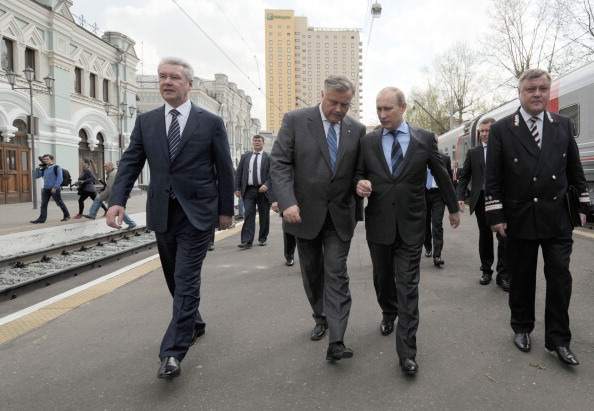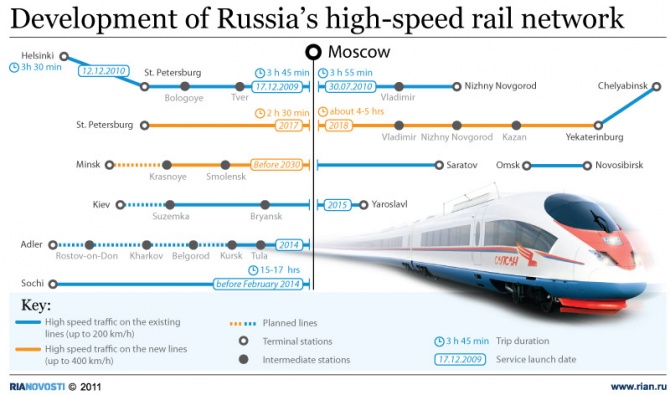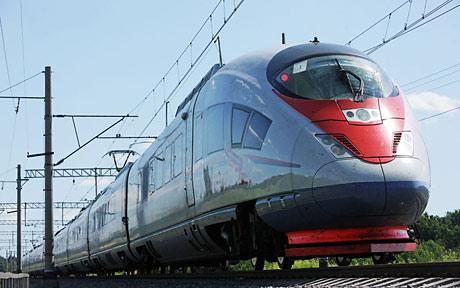By David Gold
August 23 – Russian Railways have responded to reports that the Government could shelve plans to finance high-speed rail links for the 2018 FIFA World Cup by questioning how else large numbers of people will be transported during the tournament.
Russia will have to cope with hundreds of thousands of visitors during the World Cup they host in six years’ time.
The last competition in South Africa attracted approximately 400,000 extra visitors than usual, while a million people travelled to Germany for the 2006 World Cup.
Russia, however, is far larger than either of these countries, and it is estimated that half a million people will need to be transported across the nation during the tournament.
Many of the possible host cities are also great distances apart.
For example, Kaliningrad – located between Lithuania and Poland – is 2,500 kilometres away from Yekaterinburg in the east, which in turn is another 2,000km from Sochi in the south.
A report in the Russian newspaper Vedomosti alleged that Russia could abandon high-speed rail line plans as they are not essential to the organisation of the World Cup.
It claimed that funding for the project is not included in federal spending plans for the next three years.

Russian President Vladimir Putin (pictured above, second right, at the Rizhsky railway terminal) had previously been an enthusiastic supporter of the plan.
The new rail network would cost R5.6 trillion (£112 million/$177 million/€141 million), with 70 per cent to be funded by the Russian state.
More than 100 trains, including night trains, are proposed to run on the network, including four branches connecting the host cities.
Russia’s transport infrastructure was a key Achilles’ heel identified by FIFA during the bidding process for the 2018 World Cup.
It noted the country’s reliance on air travel – even with high speed rail networks connecting six of the host cities – and concluded that capacity and more frequent flights between cities would have to be put in place.
That will be even more important if the Government does shelve rail plans.
There are already fast trains between Moscow and St Petersburg and along the Volga River between Nizhny Novgorod and the capital.
However, high-speed rail lines running from Moscow to locations including St Petersburg and Yekaterinburg were key to bringing down the time of train journeys which it has been estimated could otherwise take longer than 24 hours in the most extreme cases.
Without a high-speed train system (plans pictured below), Russia will become increasingly reliant on their air network.
In a statement sent to insideworldfootball, Russian Railways said it has “provided calculations concerning the construction project of high-speed railway lines to the Government.

“Until now Russian Railways has not received an official answer.
“The questions of financing of construction of high-speed railways are the area of responsibility of the state and Russian Railways will fulfill the decision that will be taken about it.”
Significantly, the statement went on to question how else large numbers of people will get across Russia.
“At the same time we consider these are railways that could mainly arrange movement during such a big event and otherwise this question could remain open.”
Such a move would also throw a new dynamic into FIFA’s decision-making process as it prepares to announce the host cities for the World Cup.
FIFA is to confirm the host cities at its Executive Committee meeting at the end of September.
Cities such as Kaliningrad and Yekaterinburg, due to their geography, would likely have their hopes of hosting matches compromised by any suggestion that a high-speed rail network will not be put in place by 2018.
If the report in Vedomosti is accurate, it would also be a blow to the legacy of the World Cup, as new train networks could have helped decentralise Russia and reduce the country’s reliance on Moscow as a transport hub.
That could also have had a hugely beneficial impact on regions and smaller cities across the country.
Contact the writer of this story at zib.l1734848040labto1734848040ofdlr1734848040owedi1734848040sni@d1734848040log.d1734848040ivad1734848040

